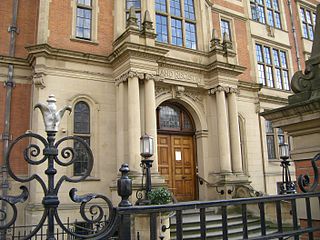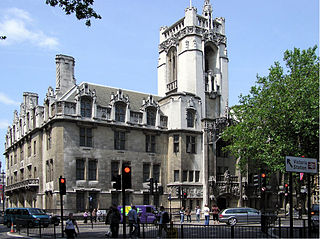A mortgage is a security interest in real property held by a lender as a security for a debt, usually a loan of money. A mortgage in itself is not a debt, it is the lender's security for a debt. It is a transfer of an interest in land from the owner to the mortgage lender, on the condition that this interest will be returned to the owner when the terms of the mortgage have been satisfied or performed. In other words, the mortgage is a security for the loan that the lender makes to the borrower.

A constructive trust is an equitable remedy resembling a trust imposed by a court to benefit a party that has been wrongfully deprived of its rights due to either a person obtaining or holding a legal property right which they should not possess due to unjust enrichment or interference, or due to a breach of fiduciary duty, which is intercausative with unjust enrichment and/or property interference.

English trust law concerns the creation and protection of asset funds, which are usually held by one party for another's benefit. Trusts were a creation of the English law of property and obligations, but also share a history with countries across the Commonwealth and the United States. Trusts developed when claimants in property disputes were dissatisfied with the common law courts and petitioned the King for a just and equitable result. On the King's behalf, the Lord Chancellor developed a parallel justice system in the Court of Chancery, commonly referred as equity. Historically, trusts were mostly used where people left money in a will, created family settlements, created charities, or some types of business venture. After the Judicature Act 1873, England's courts of equity and common law were merged, and equitable principles took precedence. Today, trusts play an important role in financial investments, especially in unit trusts and pension trusts, where trustees and fund managers usually invest assets for people who wish to save for retirement. Although people are generally free to write trusts in any way they like, an increasing number of statutes are designed to protect beneficiaries, or regulate the trust relationship, including the Trustee Act 1925, Trustee Investments Act 1961, Recognition of Trusts Act 1987, Financial Services and Markets Act 2000, Trustee Act 2000, Pensions Act 1995, Pensions Act 2004 and the Charities Act 2011.
Bristol and West Building Society v Mothew [1996] EWCA Civ 533 is a leading English fiduciary law and professional negligence case, concerning a solicitor's duty of care and skill, and the nature of fiduciary duties. The case is globally cited for its definition of a fiduciary and the circumstances in which a fiduciary relationship arises.

Lloyds Bank plc v Rosset[1990] UKHL 14 is an English land law, trusts law and matrimonial law case. It specifically deals with the translation into money of physical contributions from a cohabitee or spouse, under which its principles have been largely superseded.

Gissing v Gissing [1970] UKHL 3 is an English land law and trust law case dealing with constructive trusts arising in relationships between married couple. It may no longer represent good law, since the decisions of Stack v Dowden and Jones v Kernott.

Mortgage Corporation v Shaire [2001] Ch 743 is a widely-reported English land law case relating to the Trusts of Land and Appointment of Trustees Act 1996. Such a status specifically flowed from an instance of non est factum mortgage fraud meaning the mortgage lender and the defrauded co-owner wished to accelerate and delay sale respectively. The case is relevant to matrimonial law in that the respective equitable shares in the home awarded to Mrs Share and Mr Fox in 1987 matrimonial proceedings were never defined, it fell to the court to define these.

Cobbe v Yeoman's Row Management Ltd[2008] UKHL 55 is a House of Lords case in English land law and relates to proprietary estoppel in the multi-property developer context. The court of final appeal awarded the project manager £150,000 on a quantum meruit basis for unjust enrichment because Yeoman’s Row had received the benefit of his services without paying for that. The court refused to find or acknowledge a binding contract, prior arrangement with a third party or promise, overturning a £2m award on the basis of a possible lien arising from a promise over the property. The court found a non-binding agreement in principle, entirely subject to the owner's final say to take into account for example their view of the market; this was the basis on the facts on which the parties were proceeding.

Barclays Bank plc v O’Brien[1993] UKHL 6 is an English contract law case relating to undue influence. It set out the basic categories of undue influence as,
Bristol & West Building Society v Henning [1985] EWCA Civ 6 is an English land law case that holds a person can consent to give up the right to an overriding interest in land, that will bind third parties, such as banks, that purchase a property. Although dealing with unregistered land, it is equally applicable in the case of registered land and now falls under the Land Registration Act 2002.
Hodgson v Marks[1971] EWCA Civ 8 is an English land law case concerning the right of a person with an equitable interest in a home to remain in actual occupation, even if a bank has a charge and is seeking repossession.

Westdeutsche Landesbank Girozentrale v Islington LBC[1996] UKHL 12 is a leading English trusts law case concerning the circumstances under which a resulting trust arises. It held that such a trust must be intended, or must be able to be presumed to have been intended. In the view of the majority of the House of Lords, presumed intention to reflect what is conscionable underlies all resulting and constructive trusts.

Foskett v McKeown[2000] UKHL 29 is a leading case on the English law of trusts, concerning tracing and the availability of proprietary relief following a breach of trust.

Chhokar v Chhokar [1984] FLR 313 is an English land law case concerning constructive trusts law and widening the natural meaning of "actual occupation". The facts of the case showed an intention to do a woman out of her occupational interest in a matrimonial home, as the new co-owner buying his share from the husband knew of her situation from the outset and wished to resell the property. The court confirmed in these exact circumstances her interest was overriding at the time when she was in hospital and it was a constructive trust.
Mortgages in English law are a method of raising capital through a loan contract. Typically with a bank, the lender/mortgagee gives money to the borrower/mortgagor, who uses their property/land/home as security that they will repay the debt and any relevant interest. If the mortgagor fails to repay, then the mortgaged property which has been used as security may be subject to various mortgagee remedies allowing them to retrieve the debt. Mortgages are an important part of English land law and property law. These concern, first, the common law, statutory and regulatory rules to protect the mortgagor at the time of concluding the mortgage agreement. Second, English law defines and restricts the process for taking possession of property in the event of default. Third, it places duties on mortgagees on the price it achieves when selling property.

Barnes v Addy (1874) LR 9 Ch App 244 was a decision of the Court of Appeal in Chancery. It established that, in English trusts law, third parties could be liable for a breach of trust in two circumstances, referred to as the two 'limbs' of Barnes v Addy: knowing receipt and knowing assistance.

McDonald v Coys of Kensington (Sales) Ltd [2004] EWCA Civ 47 is an English unjust enrichment law case, concerning the nature of an enrichment.

Registered land in English law accounts for around 88 per cent of the total land mass. Since 1925, English land law has required that proprietary interests in land be registered, except in cases where it is necessary to protect social or family interests that cannot reasonably be expected to be registered. English law also runs a parallel system for around 12 per cent of land that remains unregistered.

Patel v Mirza[2016] UKSC 42 is an English contract law case concerning the scope of the illegality principle relating to insider trading under section 52 of the Criminal Justice Act 1993.














